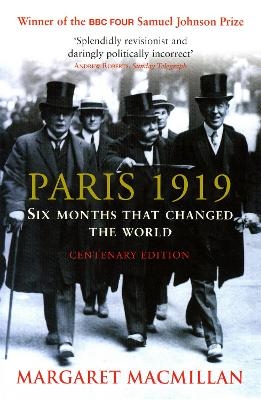
Paris 1919
Six Months that Changed the World
Seiten
2019
John Murray Publishers Ltd (Verlag)
978-1-5293-2526-3 (ISBN)
John Murray Publishers Ltd (Verlag)
978-1-5293-2526-3 (ISBN)
The story of the Paris Peace Conference of 1919, when for six extraordinary months the city was at the centre of world government as the peacemakers wound up bankrupt empires and created new countries. This book brings to life the personalities, ideals and prejudices of the settlement brokers.
Previously published as Peacemakers
Between January and July 1919, after the war to end all wars, men and women from all over the world converged on Paris for the Peace Conference. At its heart were the leaders of the three great powers - Woodrow Wilson, Lloyd George and Clemenceau. Kings, prime ministers and foreign ministers with their crowds of advisers rubbed shoulders with journalists and lobbyists for a hundred causes - from Armenian independence to women's rights. Everyone had business in Paris that year - T.E. Lawrence, Queen Marie of Romania, Maynard Keynes, Ho Chi Minh. There had never been anything like it before, and there never has been since.
For six extraordinary months the city was effectively the centre of world government as the peacemakers wound up bankrupt empires and created new countries. They pushed Russia to the sidelines, alienated China and dismissed the Arabs, struggled with the problems of Kosovo, of the Kurds, and of a homeland for the Jews.
The peacemakers, so it has been said, failed dismally; failed above all to prevent another war. Margaret MacMillan argues that they have unfairly been made scapegoats for the mistakes of those who came later. They tried to be evenhanded, but their goals - to make defeated countries pay without destroying them, to satisfy impossible nationalist dreams, to prevent the spread of Bolshevism and to establish a world order based on democracy and reason - could not be achieved by diplomacy. Paris 1919 (originally published as Peacemakers) offers a prismatic view of the moment when much of the modern world was first sketched out.
Previously published as Peacemakers
Between January and July 1919, after the war to end all wars, men and women from all over the world converged on Paris for the Peace Conference. At its heart were the leaders of the three great powers - Woodrow Wilson, Lloyd George and Clemenceau. Kings, prime ministers and foreign ministers with their crowds of advisers rubbed shoulders with journalists and lobbyists for a hundred causes - from Armenian independence to women's rights. Everyone had business in Paris that year - T.E. Lawrence, Queen Marie of Romania, Maynard Keynes, Ho Chi Minh. There had never been anything like it before, and there never has been since.
For six extraordinary months the city was effectively the centre of world government as the peacemakers wound up bankrupt empires and created new countries. They pushed Russia to the sidelines, alienated China and dismissed the Arabs, struggled with the problems of Kosovo, of the Kurds, and of a homeland for the Jews.
The peacemakers, so it has been said, failed dismally; failed above all to prevent another war. Margaret MacMillan argues that they have unfairly been made scapegoats for the mistakes of those who came later. They tried to be evenhanded, but their goals - to make defeated countries pay without destroying them, to satisfy impossible nationalist dreams, to prevent the spread of Bolshevism and to establish a world order based on democracy and reason - could not be achieved by diplomacy. Paris 1919 (originally published as Peacemakers) offers a prismatic view of the moment when much of the modern world was first sketched out.
Margaret MacMillan has a doctorate from St Antony's College, Oxford. Formerly Provost of Trinity College and Warden of St Antony's College, she is Professor of History at the University of Toronto. In 2017 she was made a Companion to the Order of Canada, and in 2018 she was appointed to the Order of the Companions of Honour. She has written several books including Paris 1919, which won the BBC Four Samuel Johnson Prize, the Duff Cooper Prize, the Hessell-Tiltman Prize and eight other prizes throughout the world.
| Erscheinungsdatum | 19.07.2019 |
|---|---|
| Sprache | englisch |
| Maße | 128 x 196 mm |
| Gewicht | 420 g |
| Themenwelt | Geisteswissenschaften ► Geschichte ► Allgemeines / Lexika |
| Geschichte ► Allgemeine Geschichte ► Neuzeit (bis 1918) | |
| Geisteswissenschaften ► Geschichte ► Regional- / Ländergeschichte | |
| Sozialwissenschaften ► Politik / Verwaltung ► Staat / Verwaltung | |
| ISBN-10 | 1-5293-2526-9 / 1529325269 |
| ISBN-13 | 978-1-5293-2526-3 / 9781529325263 |
| Zustand | Neuware |
| Haben Sie eine Frage zum Produkt? |
Mehr entdecken
aus dem Bereich
aus dem Bereich
Europa 1848/49 und der Kampf für eine neue Welt
Buch | Hardcover (2023)
DVA (Verlag)
48,00 €
Giordano Bruno - ein ketzerisches Leben
Buch | Hardcover (2024)
C.H.Beck (Verlag)
29,90 €


